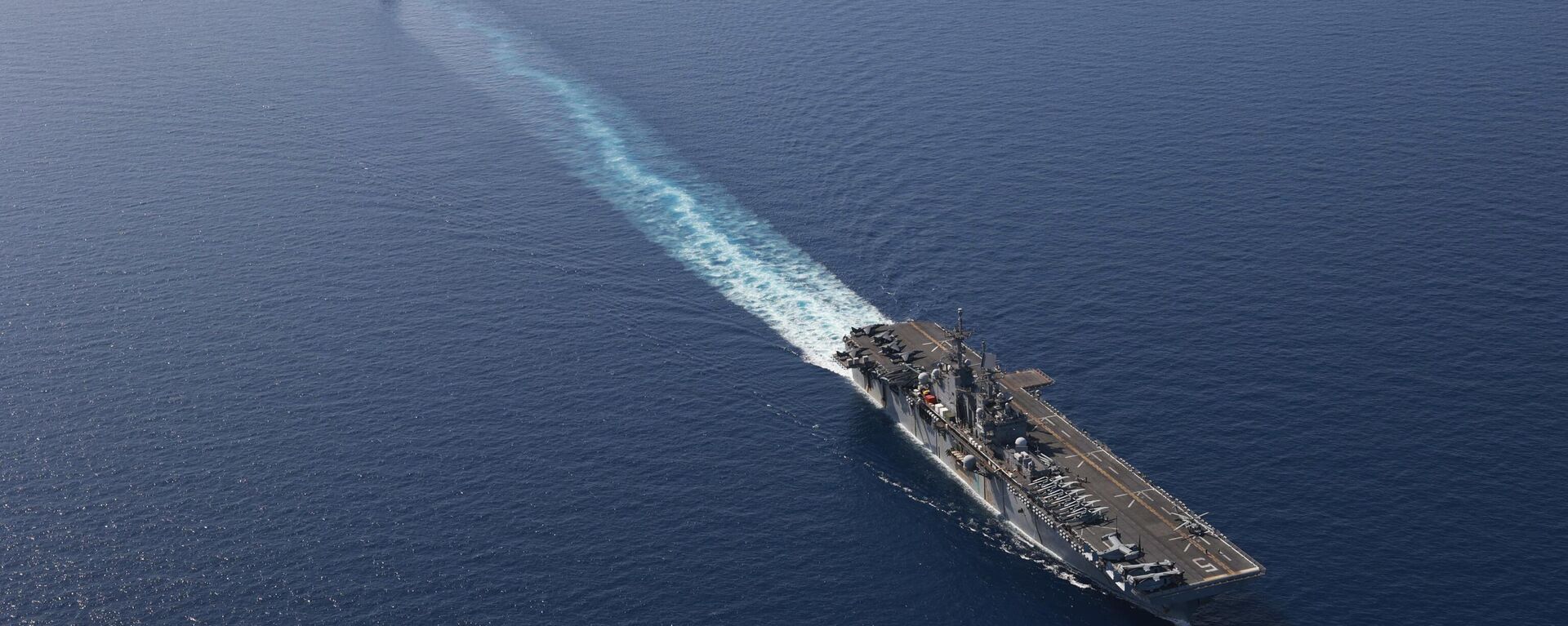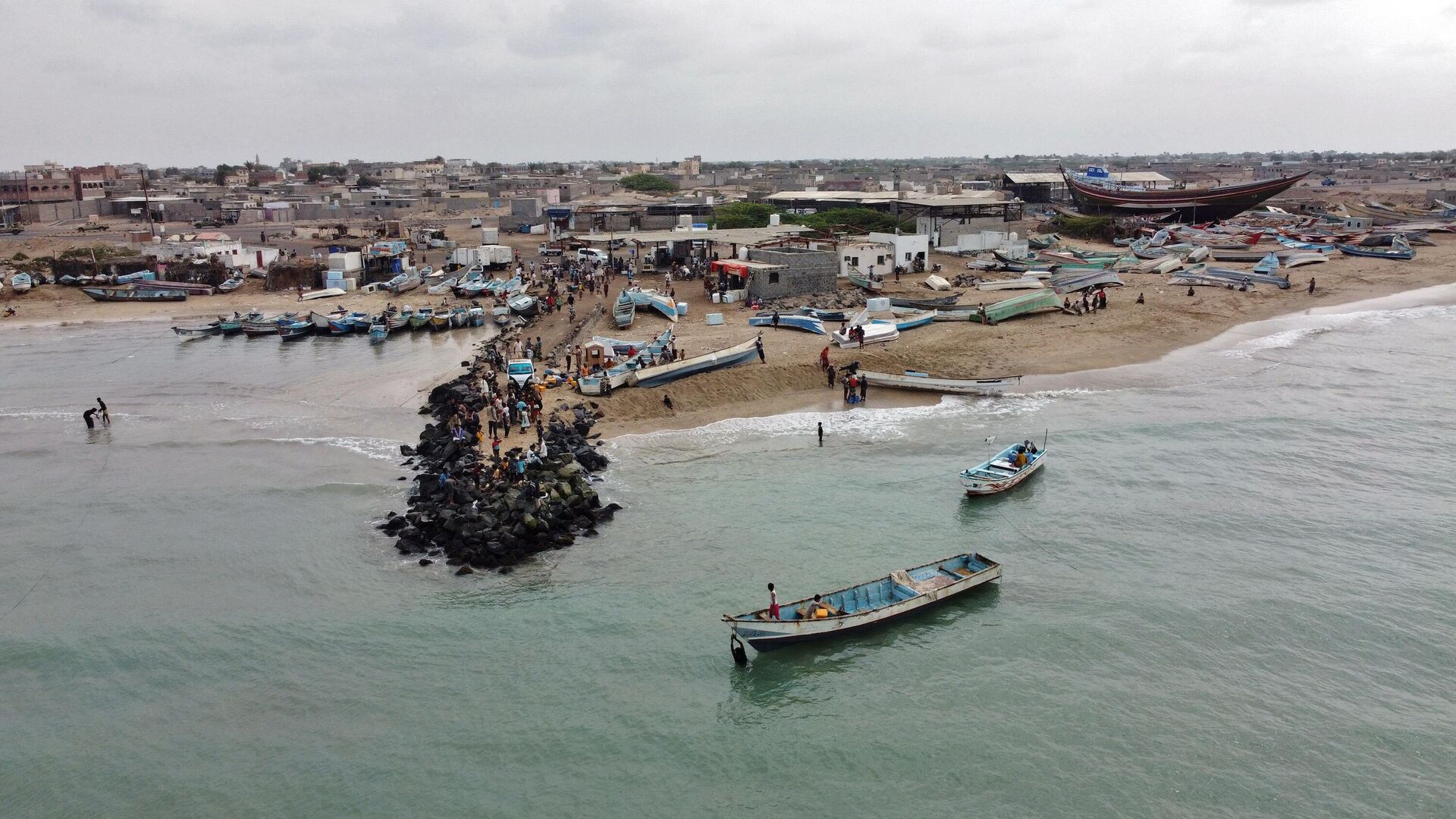https://sputnikglobe.com/20240123/1116334660.html
EU to Launch a New Military Operation in the Red Sea: Why?
EU to Launch a New Military Operation in the Red Sea: Why?
Sputnik International
The EU has approved a new mission proposed by Italy, France and Germany to protect Red Sea shipping from attacks by Yemen's Houthis. What do we know so far and... 23.01.2024, Sputnik International
2024-01-23T18:59+0000
2024-01-23T18:59+0000
2024-01-23T18:59+0000
europe
european union (eu)
houthis
red sea
european external action service (eeas)
antonio tajani
france
italy
red sea crisis
military
https://cdn1.img.sputnikglobe.com/img/07e8/01/0d/1116146283_0:0:3000:1688_1920x0_80_0_0_38aa9ac3fbb249a294f4c224502d12fd.jpg
Who's In?After some initial hesitance and amidst a backdrop of recent US-UK strikes against Yemen, which saw mixed international reactions, the European Union members have finally "agreed in principle" to establish maritime security operations in the Red Sea, foreign policy chief Josep Borrell announced on Monday, after France, Germany and Italy have called on fellow member states to contribute to the plan.Later in the day, Portugal has confirmed its participation in the EU mission according to a statement by Foreign Minister Joao Gomes Cravinho.Then, Slovak Foreign Minister Juraj Blanar announced that Bratislava will back the EU mission in the Red Sea, despite the fact that landlocked Slovakia lacks a navy.The EU strongly criticized the Yemen's Ansar Allah-led National Salvation Gopvernment, dubbed the Houthis in the west, for targeting commercial ships heading to and from Israel. Approximately 40 percent of EU trade with Asian and Middle Eastern countries passes through Red Sea waters, leaving ships having to reroute all the way around Africa.What is Known About the Op?Several Western media sources have reported that the European External Action Service is considering the deployment of at least three ships for a new mission. The EU plans to establish this mission by February 19, aiming for it to become fully operational shortly after. This new operation, dubbed ASPIDES, is intended to work alongside the French-led AGENOR mission, which focuses on ensuring safe maritime navigation in the Strait of Hormuz, as outlined on the AGENOR website. However, Dr. Marco Carnelos, a former Italian diplomat with extensive experience in the Middle East and CEO of MC Geopolicy consulting, has expressed scepticism about the feasibility of combining or re-purposing these two operations, stressing the challenge of coordinating their activities due to the geographic isolation of the forces.What Are the Risks?Western media reports suggest that the upcoming EU mission will operate independently of the US's Operation Prosperity Guardian strikes on Yemen. Several EU countries including Spain, France and Italy distanced themselves from the US operation after the Pentagon claimed they were on board earlier this month. Europe is keen on avoiding any actions that could lead to a risky escalation in the region. Italian Foreign Minister Antonio Tajani emphasized on Monday that the new European military mission in the Red Sea includes the use of military force, but only for defensive purposes, and will not strike Yemeni territory.But still, the risks for the EU member-states Naval forces would be high, Carnelos argued.
https://sputnikglobe.com/20240122/eu-top-diplomats-agree-in-principle-on-red-sea-maritime-security-operations---borrell-1116319771.html
red sea
france
italy
Sputnik International
feedback@sputniknews.com
+74956456601
MIA „Rossiya Segodnya“
2024
Christina Malyk
https://cdn1.img.sputnikglobe.com/img/07e7/09/08/1113208579_137:0:1097:960_100x100_80_0_0_39342d3133a15b1549ec31c158221a34.jpg
Christina Malyk
https://cdn1.img.sputnikglobe.com/img/07e7/09/08/1113208579_137:0:1097:960_100x100_80_0_0_39342d3133a15b1549ec31c158221a34.jpg
News
en_EN
Sputnik International
feedback@sputniknews.com
+74956456601
MIA „Rossiya Segodnya“
Sputnik International
feedback@sputniknews.com
+74956456601
MIA „Rossiya Segodnya“
Christina Malyk
https://cdn1.img.sputnikglobe.com/img/07e7/09/08/1113208579_137:0:1097:960_100x100_80_0_0_39342d3133a15b1549ec31c158221a34.jpg
europe, european union (eu), houthis, red sea, european external action service (eeas), antonio tajani, france, italy, red sea crisis
europe, european union (eu), houthis, red sea, european external action service (eeas), antonio tajani, france, italy, red sea crisis
EU to Launch a New Military Operation in the Red Sea: Why?
The EU has approved a new mission proposed by Italy, France and Germany to protect Red Sea shipping from attacks by Yemen's Houthis. What do we know so far and what are the upcoming operation's risk?
After some initial hesitance and amidst a backdrop of recent US-UK strikes against Yemen, which saw
mixed international reactions, the European Union members have finally "agreed in principle" to establish maritime security operations in the Red Sea, foreign policy chief Josep Borrell
announced on Monday, after France, Germany and Italy have called on fellow member states to contribute to the plan.
Later in the day, Portugal has
confirmed its participation in the EU mission according to a statement by Foreign Minister Joao Gomes Cravinho.
Then, Slovak Foreign Minister Juraj Blanar announced that Bratislava will back the EU mission in the Red Sea, despite the fact that landlocked Slovakia lacks a navy.
The EU strongly criticized the Yemen's Ansar Allah-led National Salvation Gopvernment, dubbed the Houthis in the west, for targeting commercial ships heading to and from Israel.
Approximately 40 percent of EU trade with Asian and Middle Eastern countries passes through Red Sea waters, leaving ships having to reroute all the way around Africa.
What is Known About the Op?
Several Western media sources have reported that the European External Action Service is considering the deployment of at least three ships for a new mission. The EU plans to establish this mission by February 19, aiming for it to become fully operational shortly after.
This new operation, dubbed ASPIDES, is intended to work alongside the French-led AGENOR mission, which focuses on ensuring safe maritime navigation in the Strait of Hormuz, as outlined on the
AGENOR website.
However, Dr. Marco Carnelos, a former Italian diplomat with extensive experience in the Middle East and CEO of MC Geopolicy consulting, has expressed scepticism about the feasibility of combining or re-purposing these two operations, stressing the challenge of coordinating their activities due to the geographic isolation of the forces.
"At the moment, these are two distinct missions for two distinct theatres of operations. If there should be a major military escalation in the area involving, in particular, Iran, the situation would change, and the chances that these two operations might be combined would increase creating a whole new regional EU operation. Let’s hope this is not going to happen," he told Sputnik.
Western media reports suggest that the upcoming EU mission will operate independently of the US's Operation Prosperity Guardian strikes on Yemen. Several EU countries including Spain, France and Italy distanced themselves from the US operation after the Pentagon claimed they were on board earlier this month.
Europe is keen on avoiding any actions that could lead to a risky escalation in the region. Italian Foreign Minister Antonio Tajani emphasized on Monday that the new European military mission in the Red Sea includes the use of military force, but only for defensive purposes, and will not strike Yemeni territory.
But still, the risks for the EU member-states Naval forces would be high, Carnelos argued.
"The risks are high, but a better assessment could be provided once the EU’s mission rules of engagement will be fully known. In other words, will the EU naval units perform passive defense? i.e. simply protecting the ships from incoming missiles and drones launched by the Houthis; or will they pass to active defense? i.e. striking the Houthis facilities inside Yemen from where the attacks are launched. It will make a significant difference, especially in the second case," he concluded.

22 January 2024, 18:21 GMT




